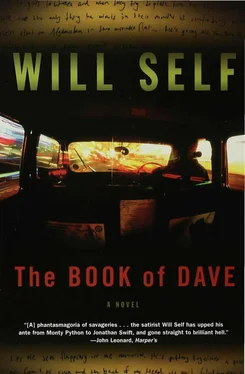'Oh, yes, yes, I think I'd enjoy that — give me the notes. And Jane' — she turned back from the door to see Busner ferreting among the papers on his desk — 'you haven't got a paperclip on you?'

Busner did enjoy his chats with Dave Rudman. He enjoyed the first one so much that when Dave's 72-hour section was over, Busner persuaded him to remain at Heath Hospital on a voluntary committal. 'It's highly unorthodox,' he confided to the patient — whom from the outset he'd found a most congenial fellow. 'We don't usually have a bed here for anyone that actually wants one, but my, ah, advanced years mean that the Trust allows me a certain, ah … leeway.' This was true: Busner's leeway included a number of intriguing patients who were tucked into odd corners of the eighth floor, like the woman who thought she was growing snakes from her scalp, and for whom Busner arranged a monthly perm at his own expense.
'How does the Book say the family should be organized?' Busner asked Dave, as they sat in his messy office with its Beuys bas-reliefs and vast collection of — mostly fake — antiquities: cuneiform seals and miniature stelae, Acheulian hand axes and jade, Toltec torture knives.
'Erm, well, it's like this.' Rudman searched inside himself for the Book: it was still there, he'd held it all. 'Men and women should live entirely separately. No mixing. Half the week the kids stay with the dads, the other half with the mums.'
'So there is no family as such?'
'No, no, I s'pose not.'
'What happens when the dads are working — they do work, don't they? Who looks after the kids then?'
'Um … girls, older girls. Girls who haven't got kids of their own yet, they're like y'know, au pairs.'
'And the older boys?'
'They, they're boning up on the Knowledge, learning the runs and the points.'
'That's men's work, is it?'
'Oh, yeah, you can't be doing with women drivers now, can you?' Dave laughed, and Busner made a note. Schizophrenics seldom laughed when recounting their delusions.

During the two months he was at Heath Hospital Dave Rudman occupied an ambiguous position. He was allowed on and off the ward, and also stayed the odd night at his flat, which was only half a mile away. He displayed — even Jane Bernal had to acknowledge — a great sensitivity towards his fellow patients, whose discordant manias, plunging depressions and flamboyant acting up were quite different from his own madness, which seemed almost measured by comparison. The lengthy withdrawal from the antidepressants left the cabbie sleepless and floundering. Plying his weary body, he sought out the fares on the ward. Leave on right my bed, right aisle, forward door to main corridor, left patients' kitchenette.
Rudman made the patients' kitchenette into his shelter and stood there at all hours, doling out hot sweet tea to bulimics with bandaged wrists and crack criminals who'd broken into their own psyches, stolen everything worth having and left only coiled turds on the carpet of their own consciousness. Dave guided these unfortunates back to their beds; he helped their twitching fingers with the big brushes and poster-paint pots during the weekly art-therapy sessions. He assisted the old Alzheimer's patients to the toilet and stood in the stinky lobby while they did their solitary business.
Then there was Phyllis. Phyllis with her tumultuous head of black, curly hair, so high and wide it threatened to fall off her head. Phyllis, with her weird, white pancake make-up and her flowing dresses, which she ran up herself from garish African fabrics. Phyllis, who through accident and inclination had fallen through the middle-class safety net into a series of unfortunate, even abusive liaisons. Phyllis, who'd pulled herself together, trained as a chef, and now supported both herself and her father-forsaken son. Phyllis, who came stumping on to the ward with her plump wrists nearly severed by the handles of many plastic bags. Bags full of bananas, newspapers, fruit-juice cartons and books, which she bore to the bedside of her son, Steve, who was full grown now and suicidal. Phyllis and Dave struck up a …
'Friendship — you're implying there's more to it than that?' Zack Busner, Jane Bernal, two junior registrars and the ward's psychiatric social worker were gathered for a case meeting.
'I don't know,'Jane continued. 'I shouldn't think there's anything sexual between them — how could there be? He's told me he's impotent — and I believe him. But there's a definite intimacy — and he's very attentive to the son.'
'To Steve?' the social worker put in.
'Yeah,' one of the junior registrars chimed up. 'He spends hours sitting with him, talking to him about' — she wrinkled her nose with amused disbelief — 'cabbing.'
'Cabbing?' Busner saw nothing funny in this. 'Well, why wouldn't he, he is a cabbie after all — as well as a prophet.'
Jane Bernal came back in. 'Phyllis Vance is also helping him sort out his living problems — debts, work and so forth. She asked me to write to the Public Carriage Office on his behalf. He's trying to find out whether he can return to work.'
'Has anyone else been helping him?' Busner asked. 'His family, friends?'
The social worker consulted her notes. 'There was a Gary Finch who came to see him a couple of times,' she said. 'He's looking after Rudman's cab. His sister came once, very uptight woman, not at all sympathetic — other than that no one. His mother never came back after the initial interview.'
'So this Phyllis …' Busner ruminated. 'It looks like she's a …'
Good thing. Best thing that's happened to me in years. . Not that I fancy her … none of that … Even Steve, Phyllis's son, felt like a good thing. Dave couldn't understand it, but when he saw the young man for the first time, slumped on his bed in the men's ward, his daft dreadlocks brushing his knees, the first five inches of his boxer shorts bagging above the waistband of his trousers like a fucking nappy, he felt a strange rush of guilt and sympathy. Jane Bernal had been talking to Dave about stereotypic patterns of thought . .fear. . racism … woman hating. . She thought it would be a good idea if he had better ideas … Cognitive Behavioural Therapy she called it.
Dave tried out a better idea. 'Orlright, mate?' he said, advancing on the supine figure. 'My name's Dave — I'm like the geezer factor on the ward. I'm a cabbie by trade, see, so I've the knowledge of the gaff, you wanna tea or sumfing, I could show yer ve day room an' vat…' Cockney clambered into his mouth alongside nerves — because the lad was looking at him with zombie eyes. Dave havered, then sat down on the bed by him. 'What's the matter, son?' he asked.
The matter with Steve was depression so fundamental and so complete that it melted his muscles and coated his mind in a tarmac of despair. Steve threw himself out of windows and beneath the wheels of cars. He hacked at himself with craft knives, he upended paracetamol bottles. His stomach had been pumped more often than he'd filled it. If the revolving door through which he entered Heath Hospital had been attached to a generator, Steve could have provided enough power for his own ECT.
When Phyllis saw that this man, who would be, were he not confined in his tracksuit to the treadmill of the ward, a typical bloody bigot, was making an effort with her mixed-race son, she took an interest in him. Over cake at the Hampstead Tearooms his story crumbled out: the cabbing, Carl, Michelle, Cal, Cohen the lawyer, the CSA, CAFCASS, the PCO, the cabbing — always the cabbing. 'Well, if that's what's bothering you so much,' she said, 'the cab, well, we better try to sort it out.' And she smiled with her tiny red bow of a mouth.
Читать дальше













